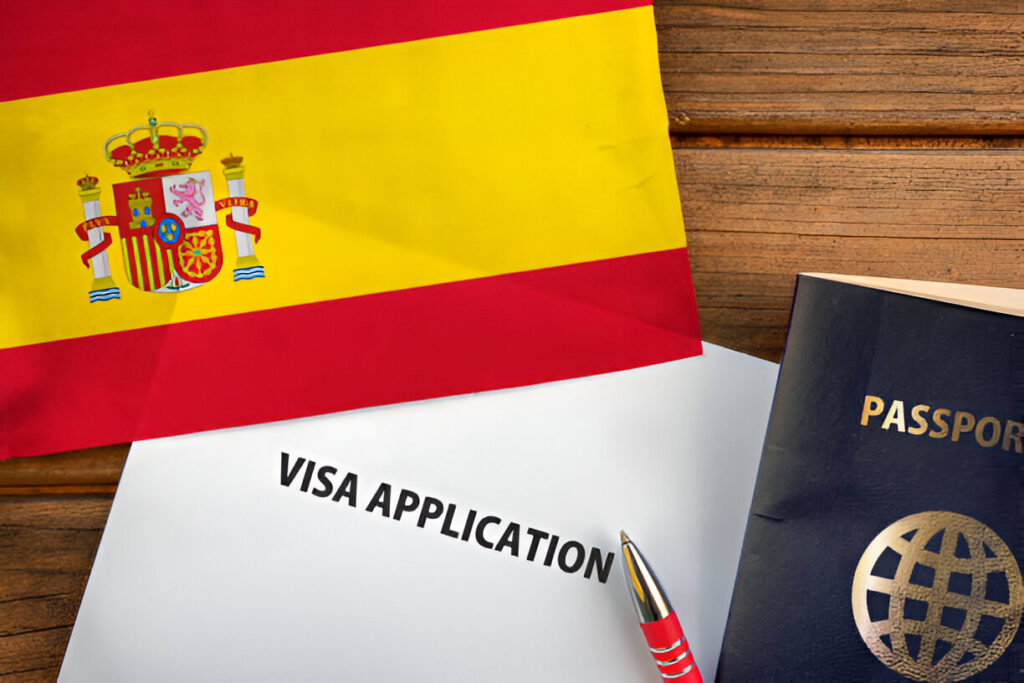Invitation Letter for Spain: When planning a visit to Spain, obtaining a letter of invitation is crucial for securing your visit visa. A Spanish invitation letter for a visit visa is essential for those invited to Spain and must demonstrate the purpose and nature of their stay.
This letter serves as a formal endorsement from the inviting party, helping to streamline the visa application process. In this blog, we will explore the importance of the invitation letter for Spain, what it should include, and how it can facilitate a smooth entry into the country. Whether you’re visiting for tourism, business, or family reasons, understanding this key document will ensure that your visit to Spain is enjoyable and hassle-free.
Getting Started with Your Invitation Letter For Spain
If you plan to visit Spain, you may need a letter of invitation to support your visa application. This section will guide you through the basics of obtaining a Spanish invitation letter for a visit visa and what to expect.

What Is an Invitation Letter?
An invitation letter is a formal document that invites someone to visit Spain. Visa applications are often required to prove the purpose of your visit and that someone in Spain is willing to host you. Suppose you’ve been invited to Spain for a specific event, like a family gathering or business meeting. This letter helps support your visa application by showing that your visit is legitimate and organized.
Who Needs This Letter?
You will need an invitation letter to apply for a visit visa to Spain. This includes tourists, business travelers, or individuals visiting friends or family. The Spain invitation letter for a visit visa proves that your stay in Spain is planned and that you have a host responsible for your accommodation and any other needs during your visit.
Who Can Give You the Letter?
The invitation letter must come from someone in Spain. This can be a family member, friend, or business associate. The person providing the letter should be a legal resident or a citizen of Spain. They must include their details, address, and a statement confirming their willingness to host you. A company or organization in Spain can also issue the letter if your visit is for business.
How Long Will It Take to Get?
The time it takes to get an invitation letter can vary. Typically, the process can take a few days to a couple of weeks, depending on how quickly the host in Spain can prepare and send the document. It’s essential to allow enough time for the letter to reach you and for you to include it in your visa application. Make sure to start this process well before your planned travel date.
How to Book an Appointment
To get an invitation letter, you need to ask your host in Spain to prepare and send it to you. Once you have the letter, you can book an appointment with the Spanish consulate or embassy to submit your visa application. Ensure you have all required documents, including the invitation letter, when you attend your appointment. If you need assistance with the appointment, you can contact the consulate or embassy for guidance on scheduling and required paperwork.
Requirements for a Spain Invitation Letter
If you’re applying for a visa to visit Spain, you’ll need an invitation letter to support your application. Here’s a breakdown of what’s required to get this letter and the associated costs.

What Do You Need to Get It?
You must provide certain information and documents to obtain a Spanish invitation letter. Here’s what is typically required:
- Personal Details: You must provide the full name, address, and contact information of the person inviting you and yourself.
- Proof of Relationship: If you’re visiting family or friends, your host should include details about how you know each other and the purpose of your visit.
- Identification: Your host in Spain will need to show proof of their legal status in Spain, such as a copy of their passport or residency permit.
- Proof of Accommodation: The letter should state where you will stay during your visit. This could be at the host’s residence or elsewhere they are arranging for you.
- Financial Responsibility: The invitation letter should confirm that the host will financially support you during your stay. This might include covering your accommodation, meals, and other expenses.
- Completed Form: Depending on the local requirements, your host may need to fill out a specific form provided by local authorities or the consulate.
Ensure your host gathers all these details and provides a comprehensive letter supporting your visa application.
How Much Does It Cost?
Generally, obtaining an invitation letter itself does not involve a direct cost. However, there may be associated costs that you should consider:
- Administrative Fees: Some local authorities might charge a small fee for processing the invitation letter, though this is only sometimes the case.
- Document Preparation: There might be associated costs if your host needs to obtain certain documents or legal confirmations.
- Courier Fees: If the invitation letter needs to be sent internationally, postage or courier fees might apply to ensure it reaches you promptly.
It’s essential to check with your host and the local authorities in Spain to understand any potential costs of obtaining and sending the invitation letter. This will help ensure you have all the necessary arrangements in place for your visa application.
Common Reasons Applications Get Denied
When applying for a visit visa to Spain, there are several common reasons why an application might be denied. Understanding these issues can help you avoid them and increase your chances of a successful application.
Problems with Empadronamiento
Empadronamiento is the process of registering with the local municipality in Spain. If your host in Spain has issues with their empadronamiento, it can affect the validity of the invitation letter. Common problems include:
- Outdated Registration: If the host’s registration details are not current, it may raise concerns about their legal status and ability to provide a legitimate invitation.
- Incomplete Registration: An incomplete or incorrect empadronamiento record can lead to delays or rejection of the invitation letter.
- Inaccurate Information: Any discrepancies between the information on the invitation letter and the empadronamiento record can cause issues. All details must match.
To avoid problems, ensure your host’s empadronamiento is up-to-date and accurate before applying for the invitation letter.
Rules for Asylum Seekers and Refugees
Asylum seekers and refugees have specific rules and restrictions regarding visas and invitations:
- Restricted Eligibility: Due to their visa status, asylum seekers and refugees may need more support to invite guests or issue invitation letters.
- Documentation Requirements: Additional documentation may be required to prove their legal status and ability to host visitors.
- Legal Limitations: Local laws might restrict the types of invitations that individuals can issue in these situations.
If you’re dealing with an asylum seeker or refugee as your host, you must check the specific regulations and ensure all necessary documentation is provided.
Issues with Guests Who Have Irregular Status
If the guest (the person applying for the visa) has an irregular status, such as overstaying a previous visa or not having proper documentation, it can lead to problems:
- Previous Visa Overstay: If you have overstayed a previous visa or have a history of irregular entries, it may negatively impact your current application.
- Incomplete Documentation: Missing or incorrect documents can lead to rejection. Ensure all required documents are submitted and complete.
- Suspicious Information: Any inconsistencies or suspicious information in your application or supporting documents can result in denial.
To avoid these issues, ensure your documentation is complete, accurate, and up-to-date, and address any previous visa or status issues before applying.
By being aware of these common problems, you can better prepare for a successful visa application and ensure that your invitation letter and supporting documents are in order.
Risks and Solutions for Your Spain Invitation Letter
Applying for a visit visa to Spain can involve several risks and challenges. Knowing these risks and how to handle them can make the process smoother. Here’s a detailed look at common issues and practical solutions.

Risks You Might Face
One of the most frequent issues in visa applications is that documentation needs to be completed or corrected. This can include missing forms, inaccurate details, or documents that don’t meet the required specifications.
- Missing Documents: Remember to include any required documents, such as proof of financial means or a valid passport copy, or your application could be delayed or denied.
- Incorrect Details: Errors in the application or supporting documents, such as wrong names, dates, or addresses, can cause confusion and rejection.
- Outdated Information: Submitting outdated or expired documents, such as an old passport or outdated financial statements, can result in problems.
Errors in the Invitation Letter
The invitation letter is a crucial part of your visa application. Any mistakes in this letter can affect the outcome of your application.
- Wrong Personal Details: In the invitation letter, errors in names, addresses, or contact details can cause complications.
- Incorrect Dates or Information: The invitation letter must accurately reflect the dates and purpose of your visit. Any discrepancies can lead to issues with your visa application.
- Unclear Purpose of Visit: The invitation letter should clearly state the purpose of your visit and the relationship between you and your host. If this information needs to be more specific or included, it could cause problems.
Issues with Empadronamiento
Empadronamiento refers to the registration with the local municipality in Spain. Problems related to this registration can impact your application.
- Expired or Incorrect Registration: If your host’s empadronamiento is not current or contains errors, it could affect the validity of the invitation letter.
- Inconsistent Information: Any inconsistencies between the details in the empadronamiento and those in the invitation letter can raise red flags.
- Problems with Registration Status: If your host’s registration status is outdated or incorrect, it can complicate your application.
How to Solve Common Issues
Ensuring all documents are complete and correct is vital for a successful visa application.
- Review Documentation Thoroughly: Before submitting your application, review all documents carefully. Check for any missing items or errors and correct them as needed.
- Ensure Accuracy: Verify that all personal details, dates, and other information are accurate and match all documents.
- Update Expired Documents: Ensure all documents, including passports and financial statements, are current and valid.
Correct Errors in the Invitation Letter
If you find mistakes in the invitation letter, correct them promptly.
- Request a Revised Letter: If the invitation letter contains errors, ask your host to correct them and issue a new one. Ensure that all details are accurate and clearly stated.
- Confirm Purpose and Dates: The invitation letter should clearly specify the purpose of your visit and the dates. This information should match the details in your visa application.
Address Empadronamiento Issues
Ensure that your host’s empadronamiento is accurate and up-to-date to avoid problems.
- Check Registration Status: Verify that your host’s empadronamiento is current and accurately reflects their address and legal status.
- Correct Inaccuracies: If there are any errors or outdated information in the empadronamiento, your host should update it with the local authorities.
By carefully addressing these common issues, you can ensure that your visa application process goes smoothly and increase your chances of receiving a successful outcome.
Tips for a Smooth Invitation Process
To make sure your application for a Spain visit visa goes smoothly, it’s essential to follow some best practices and be prepared for any issues. Here’s how you can ensure a successful application and handle any challenges.

How to Ensure Your Application is Accepted
Start by meticulously preparing all required documents to ensure your application is accepted. This includes obtaining a complete invitation letter that details the purpose of your visit, personal information of both you and your host, and accommodation arrangements. Ensure your passport is valid for at least six months beyond your planned stay in Spain, and provide proof of your financial means, such as bank statements or employment verification.
Accuracy is crucial. Verify that all personal details, such as names and dates, are correct and consistent across all documents. Cross-check the dates on your invitation letter with your planned travel dates to ensure everything is accurate.
Submit a complete application by filling out all forms thoroughly and attaching all required documents. Pay any applicable visa application fees and keep the receipt as proof. Follow the instructions provided by the consulate or embassy carefully, including booking and attending your appointment on time and submitting documents as instructed.
What to Do If You Face Issues
Contact the Spanish consulate or embassy for assistance if you encounter issues during the application process. They can offer guidance on how to address problems with your application or clarify requirements.
If you discover errors in your documents or application, correct them promptly. Make the necessary updates and resubmit the revised documents as quickly as possible. If the consulate or embassy requests additional information, please provide it immediately.
In case of delays or lack of response, follow up with the consulate or embassy to check the status of your application. Address any additional requests for information or documentation swiftly to avoid further delays.
If you need help with the invitation letter or visa application process for Spain, Marfour International Law Firm can assist. Their expertise in immigration matters ensures that your invitation letter meets all requirements and your application is complete. With their support, you can navigate the complexities of visa applications and increase your chances of a successful outcome, making your trip to Spain hassle-free.
Frequently Asked Questions (FAQs)
What is an invitation letter for a Spain visit visa?
An invitation letter for a Spain visit visa is a formal document provided by a Spanish resident or entity inviting you to visit Spain. It typically includes details about the purpose of your visit, the duration of your stay, and information about your host. This letter is essential for applying for a short-term Schengen visa to Spain.
Who needs an invitation letter to visit Spain?
You will need an invitation letter if you are from a non-visa-exempt country and travel to Spain for tourism, family visits, or business. This letter supports your visa application by proving that you have a place to stay and a reason for your visit.
How long does it take to get an invitation letter for a visa?
The time it takes to receive an invitation letter depends on how quickly your host can prepare it and how efficiently it is processed. Generally, it can take anywhere from a few days to weeks. Ensure your host provides all necessary details and addresses any potential issues promptly.
What are the common reasons for a visa application being denied?
Common reasons for a visa denial include:
- Only complete or correct documentation.
- Errors in the invitation letter.
- Problems with your visa or immigration history.
Ensuring accuracy and completeness can help avoid these issues.
Conclusion
Securing a visit visa to Spain involves several essential steps, including obtaining a proper invitation letter, ensuring all documents are accurate and complete, and addressing any potential issues promptly. By carefully preparing your application and following the necessary procedures, you can increase your chances of a smooth and successful visa application process.
Whether you’re visiting Spain for tourism, family, or business, understanding the requirements and proactively addressing any challenges will help ensure your travel plans proceed without hitches. Remember to double-check all details, stay informed about entry requirements, and seek assistance to make your trip to Spain enjoyable and stress-free.

